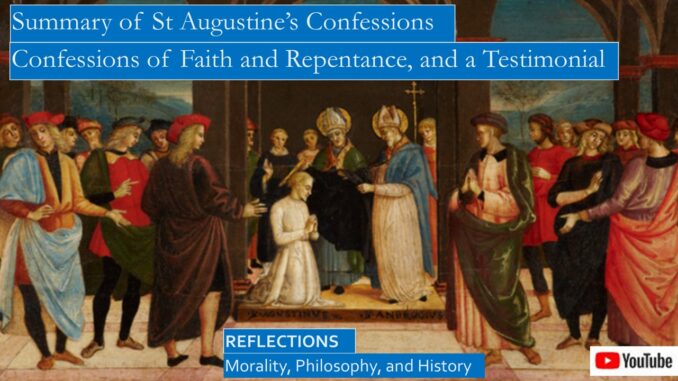
Why should we reflect on St Augustine’s Confessions, his spiritual autobiography?
Why are the Confessions central to the Western Tradition, not only to Christian thinking, but also to psychology, philosophy, and the sciences?
Why did young Augustine initially turn his back on his mother Monica’s Christian faith in his youth, joining the Manichean heresy?
How did his study of philosophy, and listening to the sermons of St Ambrose, convince the young Augustine of the truth of the Christian faith, causing him to reject the heretical doctrines of the Manichean heresy?
Why is St Augustine so fascinated by the nature of memory, dreams, and time?
How does the Genesis creation story differ from the pagan creation stories? How does Genesis express the nature of the Trinity?
This blog summarizes our six blogs and videos on the thirteen original books of St Augustine’s Confessions.
YouTube Script with more Book Links:
https://www.slideshare.net/BruceStrom1/summary-of-st-augustines-confessions-of-faith-and-repentance
YouTube video for this blog: https://youtu.be/xTHmGhGG6Bk
WHY IS ST AUGUSTINE MY FAVORITE CATHOLIC SAINT?
Why is St Augustine my favorite Catholic saint? Many church fathers emphasize how the two-fold Love of God and love of neighbor is the central teachings of the Scriptures and the Church, but St Augustine explicitly restates the need to Love God and to love our neighbor as ourselves in nearly all of his major works.
The Confessions are no different, this two-fold Love is stated by St Augustine in several books of the Confessions, including this teaching: “Surely, it is never wrong at any time or in any place for a man to Love God with all his whole heart and his whole soul and his whole mind, and to love his neighbor as himself.”[1]
ST AUGUSTINE’S INFANCY AND YOUTH, BOOKS 1 and 2 OF THE CONFESSIONS
St Augustine was born in Thagaste in North Africa, in modern day Algeria, in 354 AD, a generation after Emperor Constantine had halted the persecutions, making Christianity the favored religion of the Roman Empire. His mother Monica was Christian, his father was a pagan.
The Confessions are both a testimonial and a prayer. St Augustine tells us how he embraced Christianity after he was active in the Manichean sect, a New Age dualistic system where good and evil competed more or less evenly, and where Jesus was totally divine without a trace of mortality.
St Augustine had many of the same questions that we hear atheists and agnostics raise today, such as: How can intelligent and sophisticated men believe in superstitions about an Almighty God? How can God be Almighty when sin has such a hold in the world? What is the nature of evil?
The Confessions are more a spiritual autobiography than an historical autobiography, St Augustine retells his life story as a parable teaching us moral lessons. The Confessions are both a confession of faith and a confession of sins. St Augustine also confesses how sin came to control his life, he confesses famously that he prayed to God for chastity, but not quite yet.
As a bishop, St Augustine remembers his adolescence:
“I cared for nothing but to love and be loved. But my love went beyond the affection of one mind for another, beyond the arc of the bright beam of friendship. Bodily desire, like a morass, and adolescent sex welling up with me exuded mists which clouded over and obscured my heart, so that I could not distinguish the clear light of true love from the murk of lust. Love and lust together seethed within me. In my tender youth, they swept me away over the precipice of my body’s appetites and plunged me into the whirlpool of sin.”[2]
St Augustine, as a bishop, remembers one incident in detail, how he and his friends stole pears from a neighbor’s orchard. Many modern readers read this and ask, Why does he dwell so deeply on such childish mischief? What children don’t get into minor trouble occasionally? This hardly seems like delinquent behavior.
But for St Augustine, this symbolizes our Original Sin where Adam and Eve plucked the forbidden fruit from the Tree of Knowledge of Good and Evil. He remembers how he and his friends stole many pears, not so they could eat the pears, not to feed the hogs, but for the joy of committing the sin!
St. Augustine remembers:
“I must now carry my thoughts back to the abominable things I did in these days, the sins of the flesh which defiled my soul. I do this, my God, not because I love these sins, but so that I may Love You. For love of your love, I shall retrace my wicked ways. The memory is bitter, but it will help me to savor your sweetness, the sweetness that does not deceive but brings real joy and never fails.”[3]
Confessions of St Augustine, Youth and Adolescence, Books 1 and 2
https://seekingvirtueandwisdom.com/confessions-of-st-augustine-youth-and-adolescence-books-1-and-2/
https://youtu.be/gdK1a3AbI9w
MANICHEISM, MOTHER MONICA, AND NEOPLATONISM, BOOKS 3, 4, and 5 OF THE CONFESSIONS
St Augustine remembers the time he spent with his concubine, he was faithful to her for over a decade, and she gave birth to his son, whom they named Adeodatus, Lover of God.
Books and learning drove St Augustine’s spiritual development. St Augustine discovered Cicero’s book the Hortensius, one of the books lost in the sands of history. Cicero recommends the reader to study philosophy “not simply to admire one or another of the schools of philosophy, but to love wisdom itself, whatever it might be, and to search for it, pursue it, hold it, and embrace it firmly.” [4]
But books and learning led him away from the Christianity of his Mother Monica and into the arms of the Manichee heresy. This caused great distress in Monica, who fervently prayed that her darling son would be delivered from this heresy, fearful that the soul of her beloved son would be lost for all eternity.
Trained in classical rhetoric, St Augustine was repelled by the primitive Latin of the translated New Testament of his day, it would be many decades before his contemporary, St Jerome, whom he corresponded with, would render his more elegant Latin translation adopted by the Catholic Church for over a Millenium, the Vulgate.[5] St Augustine was deceived and fell into the Manichee heresy for over a decade.
We contrast the main beliefs of early Christianity to Manichaeism:[6]
| Christian Beliefs | Manichaeism Beliefs |
| Almighty God is omniscient, omnipresent, goodness itself | Dualistic cosmological struggle between light and darkness |
| Evil is a corruption of the good and the absence of virtue | Evil and virtue are co-equal, eternally engaged in struggle |
| Jesus Christ is the Son of God | Jesus is another prophet |
| Based on Jewish Old Testament | Derived from Zoroastrianism |
| Old Testament is Holy Scripture | Old Testament was corrupted to impose Judaism on Christianity |
| After death is judgment and resurrection of the body | Belief in reincarnation, only the perfect break free to Paradise |
Why did our young Augustine fall into this bizarre heresy? He was wrestling with many of the same questions we struggle with today. If God is Almighty, why does God permit the existence of evil in the world? What is the nature of God? Did God really create the world and all that is in it?
But books and leaning helped lead young Augustine back to the Christian Church, his study of Neoplatonist philosophy caused young Augustine to form many doubts about many Manichean doctrines. But his fellow Manichees told him to wait and pose his questions to the visiting Manichee bishop Faustus. But young Augustine found Faustus to be ignorant of classical philosophy. Though they became friends and studied philosophy together, this only deepened Augustine’s skepticism of Manicheism.
St Augustine describes his deep grief when his best friend passes away. Grief is the agony that comes upon your soul when it is torn in two when you lose your friend. St. Augustine loved his friend as if he would never die, cleaved to his friend like he was his source of happiness, loving someone he would inevitably lose. Instead, St Augustine teaches us that we should love our friends in God, love them for the sake of the happiness that is eternal, sharing in the eternal happiness with your friend, so ultimately you are loving God because you love your friend. When you have excessive grief, it means your love has gone astray.[7]
St Augustine decided to jumpstart his teaching and rhetorical career by travelling to Rome. His father had died in his youth, his mother Monica desperately wanted to travel with him, but he deceived her and departed on the ship to Rome alone, fleeing her mother smother love, love that he would later describe as impure.
St Augustine’s Confessions: Manichaeism, NeoPlatonic Philosophy, and Monica’s Prayers, Books 3, 4, and 5
https://seekingvirtueandwisdom.com/st-augustines-confessions-manichaeism-neoplatonic-philosophy-and-monicas-prayers/
https://youtu.be/ydskqlgZSrE
MONICA, MARRIAGE, AND NEOPLATONISM, BOOKS 6 and 7 OF THE CONFESSIONS
Many months passed before his mother Monica was able to book passage on another ship bound for Italy, then Rome. Augustine became disillusioned with teaching in the city of Rome, he was able to gain an appointment as teacher of rhetoric in the imperial court of Milan. Young Augustine listened to the sermons of Bishop Ambrose of Milan to improve his rhetorical skills, as Ambrose was a gifted speaker. Bishop Ambrose answered many of the misgivings young Augustine had about how to interpret the Scriptures, and he eventually became a catechumen studying the Christian faith under Bishop Ambrose.
His mother Monica arranges a marriage for her beloved son. Young Augustine reluctantly puts away his beloved concubine and plans to marry a young Christian girl, not for love, but for money and political advancement. He regrets the crass cruelty of this decision, as both he and his mother Monica were both lingering close to the gates of Babylon in this matter.
St Augustine’s Confessions: Mother Monica, Concubine, Marriage, and Philosophy, Books 6 & 7
https://seekingvirtueandwisdom.com/st-augustines-confessions-mother-monica-concubine-marriage-and-philosophy-books-6-7/
https://youtu.be/AjGbBozIReY
MOTHER MONICA DIES AFTER HER SON’S BAPTISM AND CONVERSION, BOOKS 8 and 9 OF THE CONFESSIONS
St Augustine was baptized about seventy-five years after the vicious persecutions of Christians were ended by Emperor Constantine, which meant there were many former pagans who were being baptized into the Christian faith. Christians were more serious about baptism than they are today. Young Augustine had not been baptized as a youth because Monica feared that any sins he might commit as a youth would endanger his immortal soul. This was a common fear that Bishop Augustine would dispel, encouraging infant baptism in the Christian Church.
This explains Augustine’s anxieties as he prepares himself for the challenge of living as perfect a Christian life as possible after his baptism. His anxiety was that he could not control his passions, a common concern in a Roman world so deeply influenced by Stoic philosophy.
St Augustine tells us several conversion stories that were shared with him before his own conversion. One friend converted when he read the Life of St Anthony. In the story, the future saint heard a priest preach how Jesus exhorted us that if you wish to be perfect, to sell all you own, and come, follow me. St Anthony felt that this verse was directed at him, so he sold all that he owned, moved out to the deserts of Egypt, and lived the solitary life of a hermit, inspiring many with his wisdom and kindness.
St Augustine tells the story of the philosopher Victorinus, who thought himself a Christian in his heart after being convicted from his reading of the Scriptures of the truth of Christianity. Privately, between friends, though never in public, Victorinus used to say to his friend Simplicianus, ‘I want you to know that I’m now a Christian.’ Simplicianus replied, ‘I shall not believe it or count you as a Christian until I see you in the Church of Christ.’ At this, Victorinus would laugh and say, ‘Is it then the walls of the church that make the Christian?’”
St Augustine continues, “But later on, as a result of his attentive reading, Victorinus became resolute. He was seized by the fear that Christ might deny him before the holy angels if he was too faint-hearted to acknowledge Christ before men, and he felt himself guilty of a great crime in being ashamed of the sacraments instituted by Your Word in his lowly state.”[8]
His studies answered his question, Victorinus came to realize that, indeed, the walls of the church do make the Christian. He submitted his name to the bishop to be baptized the next Easter publicly in the church.
How was St Augustine’s internal anguish resolved? He remembers: “All at once I heard the sing-song voice of a child in a nearby house,” “again and again it repeated the refrain, ‘Take it and read, take it and read.’” “I stemmed my flood of tears and stood up, telling myself that this could only be a divine command to open my book of Scripture and read the first passage on which my eyes should fall.”
St Augustine continues: “In silence I read the first passage on which my eyes fell: ‘Not in reveling and drunkenness, not in lust and wantonness, not in quarrels and rivalries, but rather, arm yourself with the Lord Jesus Christ; spend more no more thought on nature and nature’s appetites.’ I had no wish to read more and no need to do so. For in an instant” “it was as though the light of confidence flooded into my heart and all the darkness of doubt was dispelled.”[9]
The Confessions are a spiritual autobiography, St Augustine is not interested in providing the details we expect in modern autobiographies. His baptism is the climax of the book, and though St Augustine relates his spiritual thoughts and feelings over many pages and chapters and books, the only details he provides about his baptism was that there were hymns and canticles! We consulted the excellent biography of Augustine of Hippo by the historian Peter Brown for a reconstruction of ancient baptisms from many sources, including those of St Augustine himself.[10]
After his baptism, St Augustine with his family and friends had decided to give up their life at court in Milan and sail back to North Africa, where they would spend their lives as ascetics, studying Christian philosophy. Waiting for a ship to arrive, they spend time at a home with a garden in Ostia. There St Augustine and St Monica experience one of the few dual mystical visions of eternal wisdom recorded in the lives of the saints. Soon after, Monica passes away.[11]
St Augustine’s Confessions, His Conversion, Baptism, St Monica’s Death, and Philosophy, Books 8 & 9
https://seekingvirtueandwisdom.com/st-augustines-confessions-his-conversion-baptism-st-monicas-death-and-philosophy-books-8-9/
https://youtu.be/Vijtjxm3Ta0
ON SOUL, MIND, MEMORY, SALVATION AND TRUE HAPPINESS, BOOK 10 OF THE CONFESSIONS
Book Ten of the Confessions is a spiritual summary of the truths learned by St Augustine during his spiritual journey ending with his baptism and decision to return home to North Africa. We also review the thoughts of the historians Peter Brown and Henry Chadwick on the Confessions and the life of Augustine of Hippo.
The Confessions are both a spiritual journey and an intellectual journey for St Augustine, as his conversion changes how he views the world.
Many readers are puzzled by St Augustine’s detailed reflections on the role of memory in Book 10 of the Confessions. St Augustine sees the senses as gateways to the mind and the soul, and memory as an imperfect recording of past experiences, but how can imperfect memory access an immortal soul? What is the function of the soul, and imperfect memory?
We must remember that in the ancient world, your memory was an integral part of your intelligence. Memory was critical, books were hand-copied and scarce, you tried to memorize as much of every book you read as you could, because you may never see that book again. It was prohibitively expensive to assemble a library.
St Augustine also ponders dreams, wondering why we find it so difficult to control dreams, what purpose dreams serve. St Augustine ponders stoic beliefs and fasting, and the topic that interests many Christians: What is true happiness? The answer, we can only find true happiness in the two-fold Love of God and neighbor.
St Augustine closes Book Ten pondering this question: What distinguishes Christianity from NeoPlatonism, and heresies like Manichaeism? What is unique is this curious Christ who is both God and man. St Augustine teaches us, “As man, Christ is our mediator; but as the Word of God, he is not an intermediary between God and man because he is equal with God, and God with God, and together with him one God.”
St Augustine’s Confessions: On Soul, Mind, Memory, Stoicism, Salvation, and True Happiness, Book 10
https://seekingvirtueandwisdom.com/st-augustines-confessions-on-soul-mind-memory-stoicism-salvation-and-true-happiness-book-10/
https://youtu.be/xTHmGhGG6Bk
THE CREATION STORY IN GENESIS, BOOKS 11 through 13 IN THE CONFESSIONS
Many readers skip the final chapters of the Confessions, thinking that this is not part of his spiritual autobiography. But St Augustine demurs, St Augustine sees his time spent as a Manichean inquirer as both a time of rebellion from God and his Holy Scriptures, and in particular, he realized the Manichees were heretical because they rejected the Old Testament and the Genesis creation story. His conversion changes how he views the Creation story.
St Augustine begins Book 11 of these Confessions praying, “O Lord, since you are outside time in eternity, are you unaware of the things that I tell you? Or do you see in time the things that occur in it?” “Can any praise be worthy of the Lord’s majesty?” “I write this book for love of your love.”[12]
To St Augustine, the Creation is also a metaphor for us living a godly life, as Jesus exhorts us in the Sermon on the Mount, “You are the light of the world. A city set on a hill cannot be hidden. Nor do men light a lamp and put it under a bushel, but on a stand, and it gives light to all in the house.”[13] He is referring to the first day of Creation where God creates light and darkness.
St Augustine reflects on the nature of time. Are the days of Creation in Genesis actual twenty-four-hour days, or are they metaphorical days, eons rather than days, or an indeterminate measurement? Although God created light and darkness, and day and night, in the first day, they were intermingled. God did not separate the light from the darkness, and the day from the night, until the fourth day of Creation, when God also created the sun and the moon and the stars. St Augustine, after some debate, concludes that “time is not the movement of a body,”[14] time is not the movement of the sun and earth and moon that measure time.
To St Augustine, Creation is eternal, as God is eternal, and the Love of God is eternal. St Augustine glimpses the Trinity when, in the Creation story, “the Spirit of God was moving over the face of the waters.”[15] He sees the Creation as a metaphor for living a sacramental life of holiness. Man has assumed a great responsibility in his dominion over creation, his life should be sacramental, as a child created by God, he should Love God and love his neighbor as himself.
St Augustine teaches us that we are reminded of this two-fold Love when “through the sacrament of the Eucharist, the Fish which was raised from the depths is held out to us and is received as food.” “Alms-giving is like the earth bearing fruit.”[16] “The fruits of the earth represent the works of mercy which the fertile earth produces to help us in the needs of this life,” and so we should show hospitality towards our acquaintances, as many helped Paul in his ministry and when he was imprisoned.[17]
At the end of our days, mortal man will also enjoy eternal rest. St Augustine prays to God, “After all your works were done and you had seen that they were very good, you rested on the seventh day.” This is a reminder that “when our work in this life is done, we too shall rest in you in the Sabbath of eternal life, though our works are very good only because you have given us the grace to perform them.”[18]
St Augustine’s Confessions, Creation in Genesis, Manicheism, and Pagan Myths, Books 11 Through 13
https://seekingvirtueandwisdom.com/st-augustines-confessions-creation-in-genesis-manicheism-and-pagan-myths-books-11-through-13/
https://youtu.be/Ff-XsE5CuSo
[1] St Augustine, Confessions, Book 3, Chapter 8, pp. 64-66.
[2] St Augustine, Confessions, translated by RS Pine-Coffin (New York: Dorset Press, 1986, 1961, originally 400 AD), Book 2, Chapter 2, p. 43.
[3] St Augustine, Confessions, Book 2, Chapter 1, p. 43.
[4] https://en.wikipedia.org/wiki/Personal_life_of_Cicero
[5] https://en.wikipedia.org/wiki/Vulgate
[6] Eusebius, The History of the Church or Ecclesiastical History, translated by GA Williamson (New York: Dorset Press, 1965, originally 300’s AD), Book 30, pp. 319-230 and https://en.wikipedia.org/wiki/Manichaeism and St Augustine, Confessions, Book 5, Chapter 11, pp. 105-106.
[7] St Augustine, Confessions, Book 4, Chapter 4, pp. 75-76 and Phillip Cary, Augustine, Philosopher and Saint, Teaching Company, 1997, Lecture 4, Confessions, Love and Tears.
[8] St Augustine, Confessions, , Book 7, Chapter 2, pp. 159-161.
[9] St Augustine, Confessions, Book 8, Chapter 12, pp. 177-179.
[10] Peter Brown, Augustine of Hippo, Biography (Berkeley and Los Angeles: University of California press, 1967 and 2000), Chapter 11, pp. 117-118.
[11] Phillip Cary, Augustine, Philosopher and Saint, The Great Courses, 1997.
[12] St Augustine, Confessions, Book 11, Chapter 1, p. 253.
[13] https://www.biblegateway.com/passage/?search=matthew+5%3A14-15&version=RSVCE and St Augustine also quotes this verse in Book 13, Chapter 19, p. 327.
[14] St Augustine, Confessions, Book 11, Chapter 24, p. 273.
[15] St Augustine, Confessions, Book 13, Chapters 5-6, pp. 314-315.
[16] St Augustine, Confessions, Book 13, Chapter 23, p. 334.
[17] St Augustine, Confessions, Book 13, Chapter 25, p. 337.
[18] St Augustine, Confessions, Book 13, Chapter 36, p. 346.

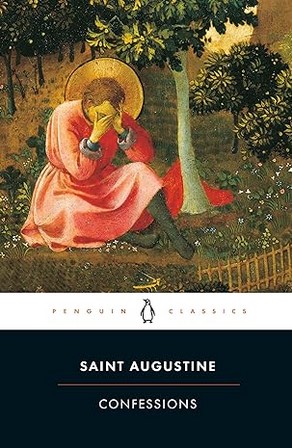
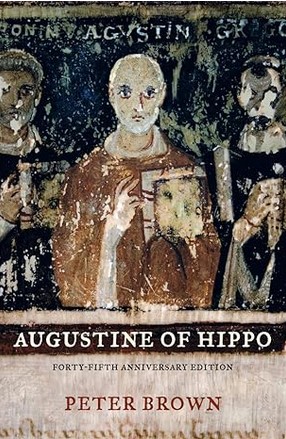
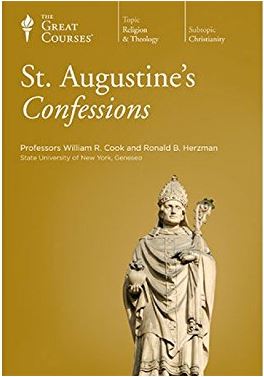
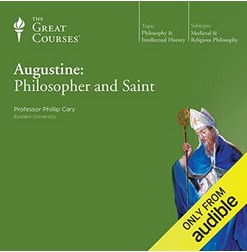
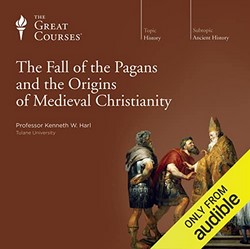
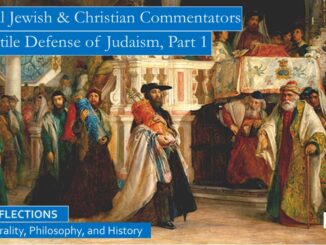
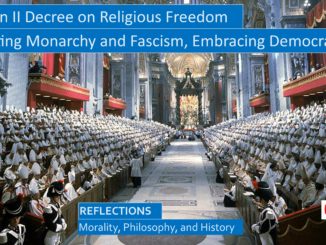
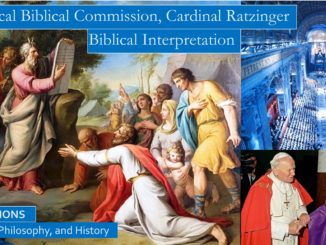
1 Trackback / Pingback